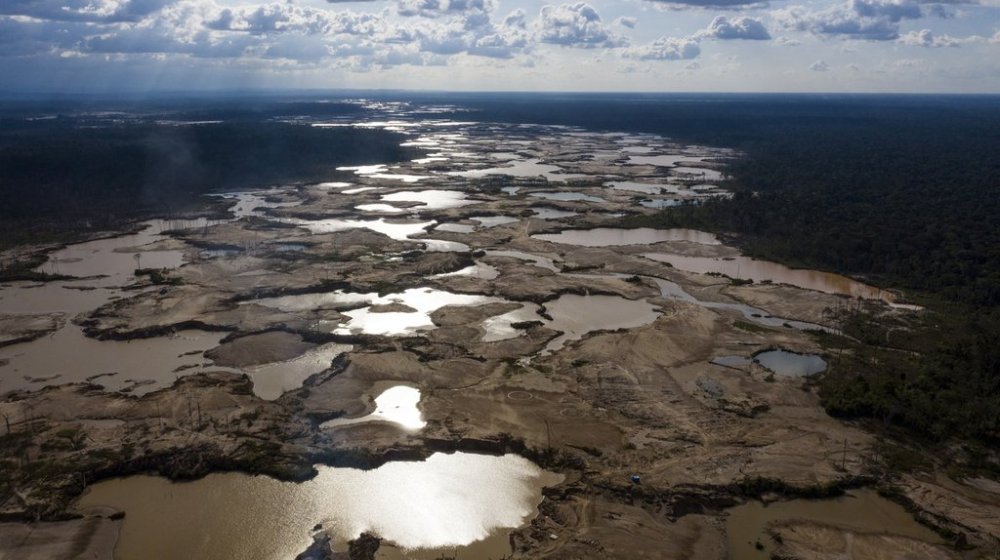Peru’s Indigenous leaders raise concerns over oil and gas projects at a human rights hearing
Advertisement
Read this article for free:
or
Already have an account? Log in here »
To continue reading, please subscribe:
Monthly Digital Subscription
$0 for the first 4 weeks*
- Enjoy unlimited reading on winnipegfreepress.com
- Read the E-Edition, our digital replica newspaper
- Access News Break, our award-winning app
- Play interactive puzzles
*No charge for 4 weeks then price increases to the regular rate of $19.00 plus GST every four weeks. Offer available to new and qualified returning subscribers only. Cancel any time.
Monthly Digital Subscription
$4.75/week*
- Enjoy unlimited reading on winnipegfreepress.com
- Read the E-Edition, our digital replica newspaper
- Access News Break, our award-winning app
- Play interactive puzzles
*Billed as $19 plus GST every four weeks. Cancel any time.
To continue reading, please subscribe:
Add Free Press access to your Brandon Sun subscription for only an additional
$1 for the first 4 weeks*
*Your next subscription payment will increase by $1.00 and you will be charged $16.99 plus GST for four weeks. After four weeks, your payment will increase to $23.99 plus GST every four weeks.
Read unlimited articles for free today:
or
Already have an account? Log in here »
Hey there, time traveller!
This article was published 04/03/2025 (244 days ago), so information in it may no longer be current.
BOGOTA, Colombia (AP) — Indigenous leaders from the Peruvian Amazon who are calling for the government to stop oil and gas projects in their territory took their case to an international human rights body on Tuesday.
The leaders presented evidence of the impact of oil and gas exploration at a hearing before the Inter-American Commission on Human Rights. They said the projects violate Indigenous rights by threatening their land, health and food security and are in breach of international obligations that require Indigenous groups to be consulted.
The Indigenous leaders are represented by the Interethnic Association for the Development of the Peruvian Rainforest, or AIDESEP. The group argues that the projects also pose risks to uncontacted Indigenous groups and also noted specific impact on Indigenous women.

During the meeting, the Peruvian government said it is a democratic state which respects law and guarantees human rights to all its citizens and that it is committed to strengthening it.
But Julio Cusurichi Palacios, a member of AIDESEP’s Board of Directors from the Madre de Dios region of the Amazon said the government “have stated things that are not in accordance with what is happening in reality.”
“The rights of Indigenous peoples are not being respected, the contamination of our rivers and territories continues, there are threats to uncontacted Indigenous Peoples, more regulations that make environmental standards more flexible, and oil and gas lots continue to be promoted,” he told The Associated Press after the hearing.
The government denied most of the claims made by the Indigenous groups and did not reply to AP’s requests for comment.
Recent reports have found that the Peruvian government continues to auction Indigenous lands for oil and gas exploration. Approximately 75% of the Peruvian Amazon — home to 21 Indigenous groups — is covered by oil and gas concessions, many of which overlap with Indigenous territories, according to the International Work Group for Indigenous Affairs.
“I believe this situation has been getting increasingly worse,” Cesar Ipenza, an environmental lawyer who took part in the hearing, told AP. “There’s a policy of promoting extractive activities in highly vulnerable areas, especially in the Amazon.”
He added that the impact on the environment and the lack of communication with Indigenous groups is already evident, but “the Peruvian state claims that everything is fine and that there are no problems with oil and gas activities.”
The commission has asked the Peruvian government to provide written responses to the claims, focusing on their protocols for handling oil spills and supporting affected communities. Joint data from several Peruvian organizations has documented 831 oil spills in the Peruvian Amazon.
There are at least 20 uncontacted tribes in Peru that live in the most remote, uncontacted regions of the Amazon rainforest, according to Survival International, an advocacy group for Indigenous peoples.
Survival International told AP the recent appearance of dozens of uncontacted Mashco-Piro people near logging concessions inside their territory, and subsequent deadly encounters between logging workers and the Indigenous people, underline just how vulnerable these groups have become.
“Because they’ve failed to get redress in Peru, Indigenous organizations there have turned to international fora like the Inter-American Commission on Human Rights,” said Teresa Mayo, Peru researcher for Survival International.
“They want the Commission to force Peru to abide by the international laws and treaties it’s signed up to, rather than ignore those aspects which it finds inconvenient.”
—
The Associated Press’ climate and environmental coverage receives financial support from multiple private foundations. AP is solely responsible for all content. Find AP’s standards for working with philanthropies, a list of supporters and funded coverage areas at AP.org.


